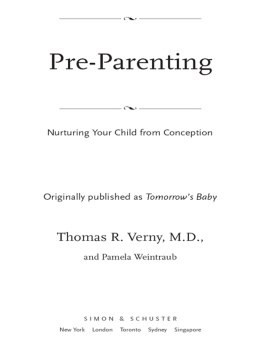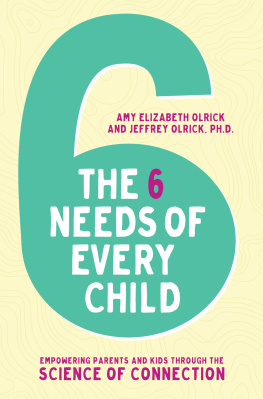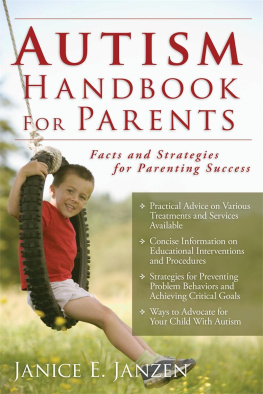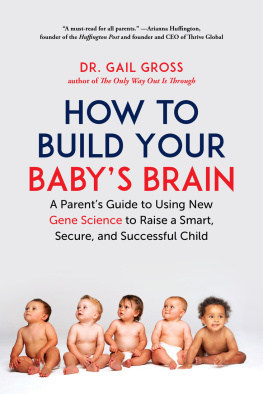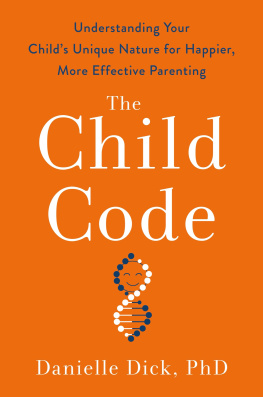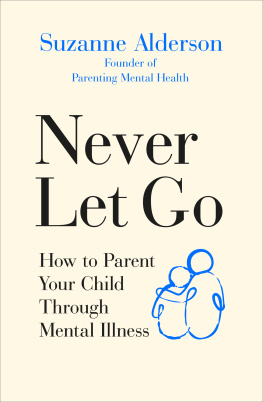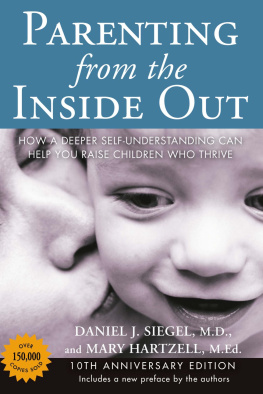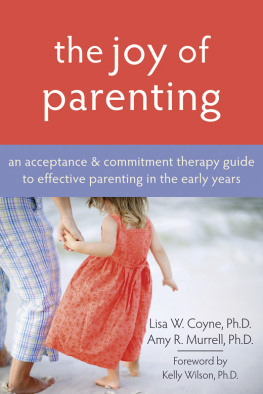

SIMON & SCHUSTER
Rockefeller Center
1230 Avenue of the Americas
New York, NY 10020
Copyright 2002 by Thomas R. Verny and Pamela Weintraub
All rights reserved,
including the right of reproduction
in whole or in part in any form.
Originally published as Tomorrows Baby
S IMON & S CHUSTER and colophon are registered trademarks of Simon & Schuster, Inc.
The Library of Congress has cataloged the hardcover edition as follows:
Verny, Thomas R.
Tomorrows baby : the art and science of parenting from conception through infancy / Thomas R. Verny and Pamela Weintraub.
p. cm.
Includes bibliographical references and index.
1. Child care. 2. Parenting. 3. Child rearing.4 . Parent and child. 5. ChildrenCare and hygiene. I. Weintraub, Pamela. II. Title.
RJ131 .V47 2002
649.1dc21 2001054959
ISBN-13: 978-1-4165-9325-6
ISBN-10: 1-4165-9325-X
Visit us on the World Wide Web:
http://www.SimonSays.com
Introduction
Over the past decade, revolutionary discoveries in neuroscience and developmental psychology have shattered long-held theories of early development, toppling our most vaunted traditions of parenting. The news from the world-class laboratories at Yale, Princeton, Rockefeller, and elsewhere is breathtaking in scope. Starting from the moment of conception, a childs brain is wired by his or her environment. Interaction with the environment is not merely one aspect of brain development, as had been thought; it is an absolute requirement, built in to the process from our earliest days in the womb.
When it comes to early development, scientists outside the field of neuroscienceincluding those who teach at universities and influence public opinionoften maintain more traditional views. Most geneticists, for instance, still think that genes overwhelmingly determine the way the brain develops. And until recently, most psychologists agreed that prior to age three, experience had limited influence over intelligence, emotions, and the structure of the brain. The latest discoveries in neuroscience, however, prove such notions false. The brain is sensitive to experience throughout life, but experience during the critical periods of prenatal life and early postnatal life organizes the brain. Our brains and, consequently, our personalities emerge from complex interplay between the genes we are born with and the experiences we have.
We now know what has always seemed intuitively truethat separating the mind from the body or nature from nurture is impossible. Every biological process leaves a psychological imprint, and every psychological event changes the architecture of the brain. In short, early experience largely determines the architecture of the brain and the nature and extent of adult capacities. A secure relationship with one or two primary caretakers leads to more rapid acquisition of emotional and cognitive skills. Such interactions confer not just temporary advantages but permanent ones because they are evolutions number one tool for constructing the brain.
These findings emerge against erroneous concepts of child development that have led us astray for years. No longer can we invoke abstract developmental timetables suggested by the likes of Freud and Piaget, who attributed scant perception or cognition to the child under three; tantalizing though their theories seemed for many decades, they simply do not hold up against the rigors of modern brain scans and double-blind studies of the very young. No longer can we point to Darwins theory of evolution as proof that humans are mindless automatons driven by their genes to mercilessly propagate the species and survive; the social nature of brain building means this cant be so. And no longer can we view our children through the lens of economics-asking how exposure to poverty or crime will affect their lives-unless we factor in the more important elements of mothering and fathering, too.
I have written Tomorrows Baby to bridge the polarities-to make a connection between the troublesome ideas of the past and the truths gleaned from science, between the influence of experience and that of genes. Ill describe the interface between psychology (how a father holds his baby) and biology (what happens in the babys body and brain).
Ten years ago, I could only have guessed at this. Today, backed by hundreds of reliable and verifiable findings from the worlds leading universities and labs, the answers are certain and bound to change the way we parent and teach the young. By taking the concepts of psychology and translating them into concrete, measurable, and observable phenomena, neuroscientists have uncovered the inner human timetable for the acquisition of many capacities, including those for social relations, empathy, and love. When and how can parents sculpt the growing brain for something as seemingly elusive as basic goodness? When is it too late? Where do depression and violence start, and can parents extinguish the predispositions to these traits before they become self-fulfilling for life? The secret lessons of neuroscience and early development offer meaningful answers to these questions.
For instance, the new brain science has mounted a staggering assault on the notion that learning is more or less constant through the first three years of life. Instead, brain scans tell us, learning is actually explosive, occurring as different regions of the brain fire up, on schedule, for the acquisition of specific skills, from language to music to math. Teach something to your child when the learning window for that skill is open, and he or she will learn it well; miss it, and the skill will be hard if not impossible to acquire later.
Every age has defined the brain in terms of its leading technologies. Thus only recently we have witnessed the shift from the old analogy of the brain as electrical circuitry to the brain as computer. Though the brain has certain things in common with computers, it is far more subtle and complex. For one thing, it is a living organism capable of growing, multiplying, and dying. For another, and this is really crucial, it is bathed in a biochemical soup of hormones, neurotransmitters, and polypeptides that allow it to establish two-way communication with far-flung regions of the body. It is these messenger molecules that enable pregnant mothers to communicate so intimately with their unborn children, and later on, these same molecules that determine whether we are prone to depression or joy, anxiety or calm. Computers lack consciousness. They feel neither pain nor joy, and unlike the readers of this book, they lack the basic desire to make a better world for the young.
A NEW PARADIGM FOR PARENTING
The new brain science proves that human emotion and the sense of self originate not in the first year after birth, but significantly earlierin the womb. When I first suggested this concept in my 1981 book, The Secret Life of the Unborn Child , it was considered controversial. Perhaps because the research was then so preliminary, I opened myself up to skepticism writ large from the scientific community. While scientists balked, large segments of the public, especially mothers, readily accepted the conclusions: that pregnant women and their unborn children can sense each others thoughts and feelings; that it makes a difference whether we are conceived in love, haste, or hate, and whether a mother wants to be pregnant; that parents do better when they live in a calm and stable environment, free of addictions and supported by family and friends. In the past ten years, dozens of lines of evidence and thousands of research studies have validated my original ideas, particularly with respect to the overwhelming role that prenatal and early postnatal experiences play in the development of personality and the mind.
Next page
